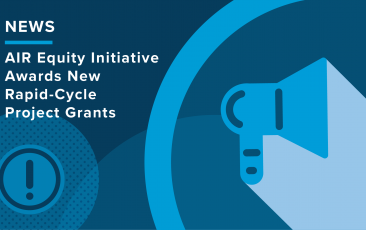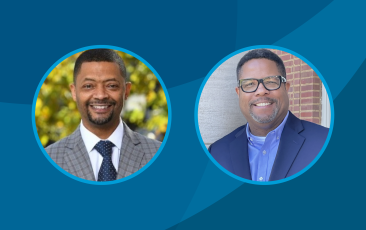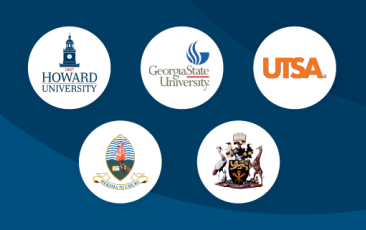Engaging Communities and Building Relationships | The AIR Equity Initiative
Sharing evidence and starting conversations to advance equity together
As a convenor of voices from across the spectrum of research, policy, and practice, the AIR Equity Initiative invites dialogue, connects with communities, and illuminates evidence to extend the reach and impact of our work.
Equity Initiative Annual Report

Creating Connections
The 2023 AIR Equity Initiative annual report features stories, data, and project highlights from our efforts to build bridges toward a more equitable world, where all communities and people can thrive.
View the 2022 Annual Report, Bridges to Equity: A Promising Beginning
Equity Initiative News & Events
News
Events
Pathways to Peace: Reimagining the Future of Public Safety for Youth and Communities
In October 2023, the AIR Equity Initiative hosted its first Working at the Intersections public symposium. At Pathways to Peace: Reimagining the Future of Public Safety for Youth and Communities, the AIR Equity Initiative united community leaders, young people, policymakers, researchers, and practitioners for conversations on the urgent topic of youth justice and public safety in Nashville and beyond.
Read our post-event blog post, Why Community Members are Vital Partners for Transforming Public Safety Research into Action, and view these videos to hear from the event speakers:
- Public Safety Belongs to You
- Amplifying the Voices of People Most Impacted by Public Safety Systems
- Using Participatory Approaches to Redesign Public Safety Systems
- Voices from Nashville Weigh in on Public Safety
- Pathways to Peace – Full Event Recording
Highlights: Building Pathways to Peace in Nashville
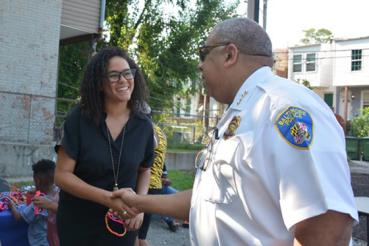
AIR Equity Initiative Roundtable Webinar Series
AIR holds roundtable discussions that address the issues at the core of our national conversation on equity in the areas of workforce development, education, public safety and policing, and health.
View the recordings and read the post-event blog posts:
Equity Initiative Insights

Equity-Centered Thriving
Thriving- and equity-related goals offer hope for improving the world, yet they remain challenging to achieve. Previous attempts to reach these goals have often been hindered by overly restrictive objectives and standards. This paper proposes a fresh approach to achieving goals related to thriving and equity that include embracing new ideas for research and practical applications.
Integration and Equity 2.0: New and Reinvigorated Approaches to School Integration
Schools in the United States are more segregated today than they were 30 years ago. In this landmark essay series, the AIR Equity Initiative weaves a tapestry of diverse voices, delivering insights and evidence for all who aspire to build a better and more equitable future for our nation’s young people.
Is There a Path Forward? Affirmative Action in Higher Education After the Supreme Court’s Decision
On June 29, the Supreme Court ruled that race-conscious college admissions policies are unlawful under the equal protection clause of the 14th Amendment. In our role as a convener of ideas and insights, we are publishing essays from three leading scholars on affirmative action, higher education policy, and diversity.
View videos from the AIR Equity Initiative including event presentations and our "Equity Shorts" concept explainer series.
Seven Lessons Learned from a First-of-Its-Kind School Integration Initiative
While the K-12 public school student population grows more diverse, many schools remain divided along racial, ethnic, and economic lines. The Bridges Collaborative, a first-of-its-kind school initiative of The Century Foundation, aims to change that. An interdisciplinary team of AIR researchers and experts is studying this initiative-in-progress for insights.
The Role of Mentoring in Building the Future of Research
Kam Williams and Dominique Bradley met when Dominique co-taught a class offered as part of AIR’s Pipeline Partnership Program, which aims to strengthen the diversity of the research field by supporting graduate students who reflect the racial, cultural, and socioeconomic diversity of the communities they serve. As part of the P3 program, some participants are assigned official mentors, but sometimes mentoring relationships also develop organically, like Kam and Dominique’s.

In Conversation with Bob Kim and Terris Ross
Robert “Bob” Kim, an AIR Institute Fellow, served as deputy assistant secretary in the Office for Civil Rights of the U.S. Department of Education during the Obama administration. Terris Ross, a managing director for the AIR Equity Initiative, conducted and led numerous PreK-12 research and evaluation projects at the Department, where she worked with Kim for several years. The two colleagues recently had conversations about policy development and implementation, and about educational equity.
- Part I: Why Some Education Policies Fall Short, and What Can Be Done About It
- Part II: The Role of Research and Evidence in School Integration Policies
Four Perspectives on Helping All Students Thrive
At an AIR Equity Initiative roundtable on May 25, 2022, AIR Board of Directors Vice Chair Lawrence Bobo moderated a panel of four experts representing different aspects of the educational system, each of whom highlighted persistent challenges that arose during the pandemic—or were exacerbated by it—as well as policy and practice innovations that helped practitioners to respond.
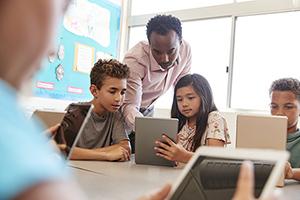
The Intersection of Technology and Educational Equity—Before, During, and After the Pandemic
Technology has the potential to close achievement gaps but also exacerbate disparities. At the beginning of the pandemic, Michael Garet, vice president and institute fellow, led experts from across AIR to launch the National Survey of Public Education’s Response to COVID-19. In this Q&A, he and Tracy Gray, managing director, AIR Equity Initiative and the project director for the 2017 National Education Technology Plan, talk about equity, technology, and the future of education.
Working to Make Diverse Perspectives in Research, Policy, and Technical Assistance the Norm
During the Building Bridges to Equity: Making Diverse Perspectives in Research, Policy, and Technical Assistance the Norm event, a panel of experts offered important takeaways for individuals and organizations who want to help ensure that diverse perspectives are regularly sought and included.
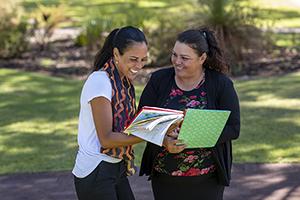
How Mentoring Supports Diversity, Equity, and Inclusion at AIR
Mentoring is an important part of AIR’s commitment to diversity, equity, and inclusion, both within and beyond our institution. In this Q&A, Karen Francis, vice president and chief diversity, equity, inclusion officer, and Kim DuMont discuss our mentoring programs and highlight how they each support DEI at AIR.
Making Workforce Development Work for All: Five Themes from Our Panel Discussion
During the Bridges Toward Equity: Making Workforce Development Work for All roundtable event, a panel of AIR and community experts shared how stakeholders can work together to pursue an agenda to increase economic mobility and prosperity for the many Americans who are currently being left behind. Here are the five main themes explored during the event.

Opportunity remains segregated in America. Evidence can be the bridge to a more equitable world.
Efforts to address inequities can be siloed and aren’t always based on evidence. The AIR Equity Initiative is taking a different approach, working across systems, partnering with local organizations, and relying on the generation and use of evidence. In this blog post, Kim DuMont explains this approach.

Supporting Up-and-Coming Researchers and Practitioners
Over four days, 66 doctoral students from a variety of backgrounds engaged with AIR experts, Institute Fellows, and one another about how to design surveys anchored in cultural and linguistic knowledge, skills, and values. This first-of-its-kind AIR workshop is part of our Pipeline Partnership Program, which seeks to enhance the diversity of the field of behavioral and social sciences by engaging graduate students who reflect the diversity of the community.
